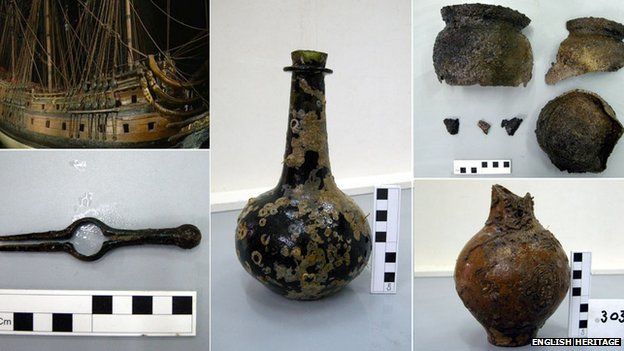Southend shipwreck The London 'similar to Mary Rose'
- Published

The excavation of an underwater wreck could be "similar in scope" to the Mary Rose warship, archaeologists have said.
Divers have recovered a series of objects from the ship called The London, which exploded off the coast of Southend in 1665.
The haul so far includes pewter spoons, coins and navigational dividers.
A project spokesman said: "The artefacts we can recover may be similar in scope to those... from the Mary Rose, but 120 years later in date."
The Mary Rose saw 34 years of service before it sank while leading an attack on a French invasion fleet in 1545. Around 19,000 artefacts were found on board after it was raised from the seabed of the Solent in 1982.
The London was built in Chatham in Kent and mysteriously exploded on a journey along the coast to Gravesend in 1665.
Specialist divers have undertaken 10 dives of the site of the wreck, which lies in two parts on the seabed.
Mark Dunkley, a maritime archaeologist at English Heritage, said: "There are still five dives to go but what we have confirmed so far is that the well preserved and vulnerable remains of the wreck of the London are consistent with the historical records that she did in fact blow up."
Steve Webster, project manager at Cotswold Archaeology, said: "This two-year project is the only ongoing excavation on an underwater wreck in England.
A huge explosion in split the warship in two, killing 300 people
"This will allow us to better understand a whole range of changes that occurred between the first half of the 16th Century and the second half of the 17th Century, a period that saw the expansion of Britain's sea power and marks the start of the British Empire."
The London was rediscovered during preparatory works before the start of the London Gateway Port development in Thurrock in 2005.
The objects found will be curated by Southend Museums Service.
- Published27 May 2014